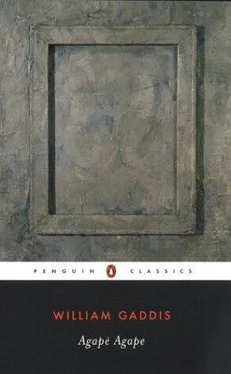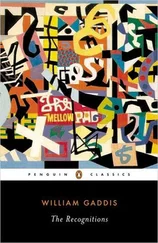It had been my intention to devote the most careful study to all these books and articles and only then, having studied them with all the thoroughness the subject deserved, to begin writing my work, which I believed would leave far behind it and far beneath it everything else, both published and unpublished” you see what this is all about? “I had been planning it for ten years and had repeatedly failed to bring it to fruition,” but of course you don’t no, no that’s the whole point of it! It’s my opening page, he’s plagiarized my work right here in front of me before I’ve even written it! That’s not the only one. That’s not the only one either, he’s done it before, or after, word for word right in this heap somewhere you could call plagiary a kind of entropy in there corrupting the creation it’s right in here somewhere I can never find anything in this mess never get it sorted out, never get it in any kind of order but that’s what it’s all about in the first place isn’t it? Get things in order that’s half the battle in fact it is the battle, organize what’s essential and throw out the rest of it that’s the, Phidias? For me an image slumbers in the stone who’s that, Nietzsche? Probability, chance, disorder and breakdown here’s that punched paper roll holding the the, damn! Getting blood all over these pages of ads for what I just said didn’t I? Whole thing turns into a cartoon? an animated cartoon? Chance and disorder sweeping in and this binary system digital machine with its all-or-none paper roll holding the fort yes it was the fort, whole point of it to order and organize to eliminate chance, to eliminate failure because we’ve always hated failure in America like some great character flaw what technology’s all about, music entertainment counting, counting, seventy years ago one great pianist cutting a roll coordinating his hands and pedaling within a fiftieth of a second 1926 one company cut and sold ten million rolls whole thing turns into a cartoon, mob out there crash bang storming the gates seeking pleasure democracy scaling the walls terrifying the elite who’ve had a corner on high class entertainment back to Marie Antoinette storming the Bastille with here yes, here’s one yes, here’s a German ad 1926 holding the line for the class act against here they come, here they come, “a still larger class of people who cannot successfully operate the usual type of player, because they lack a true sense of musical values. They have no ‘ear for music,’ and for that reason they play atrociously upon pianos equipped even with high grade player actions” talking about the class act? about defending these elitist music lovers? Not here no, talking about what we’re always talking about. Sales! “Hence, too often, potential sales in a neighborhood are killed by someone unable to do justice to the possibilities of the player-piano he has purchased. To reach the enormous markets of the non-musical and half-musical and to conquer the growing prejudice of the truly musical” what are we going to do, educate this pleasure seeking rabble? There’s Plato again agreeing that the excellence of music is measured by pleasure, but for this gang out there playing You’re a Dog-gone Daisy Girl with its feet? Good God no, for them Plato rhymes with tomato, it can’t be the pleasure of chance persons, he says, it’s got to be music that delights the best educated or you get your poets composing to please the bad taste of their judges and finally the audience instructing each other and that’s what this glorious democracy’s all about isn’t it? Tried to sell sets of “Educator” piano rolls eleven-fifty for a hundred thirty two lessons to teach them how to play the piano with their hands nothing doing no, no, here’s one, here’s what they wanted. “You can play better by roll than many who play by hand” you see? “And you can play all pieces while they can play but a few. And now even untrained persons can do it,” breaks your heart. “The biggest thrill in music is playing it yourself. It’s your own participation that rouses your emotions most,” whole thing breaks your heart, here’s another. “Retains its artistic ‘feel’ indefinitely,” goes back to the turn of the century before the player piano, when it was still the piano player, big thing you wheeled up to the piano same punched roll it played on the keys with wooden fingers, tiny felt-tipped wooden fingers playing Scarlatti, Bach, Haydn “and old Handel. Unhappy Schubert speaks to them in the sweet tones of Rosamunde. Beethoven, master of masters, thrills alike” right on to Chopin bemoaning the fate of Poland and breathing “the fiery valor of his countrymen in Polonaise” and here’s Debussy and Grieg giving testimonials. “Many of the artists will never play again, but their phantom hands will live forever” there that’s what it’s about, no more wooden fingers but phantom hands. “What stands between you and the music of the masters?” and then “If you were playing the ‘Pilgrims’ Chorus,’ how much would it mean to you to have the composer, Wagner himself, by your side?” Good God! “great Wagner comes and, lifting them aloft above the clouds, transports them to the mighty Halls of old Walhalla, in Ride of Walkyries, or takes them to the cool, green depths of classic Rhine in Nibelungen Ring” standing beside you? Be terrified, if you had any sense you’d be terrified, no more wooden fingers here’s the phantom hands at the keyboard, here. “If Beethoven could be heard by us today playing his sonatas” lucky he was deaf he’d, blood on the, look at that, arm right down to my hand veins look ready to burst no more tiny felt-tipped wooden fingers no, see what breaks your heart? “Science has perfected absolute pianistic reproduction” read Trilby, end up with a physiologist named Johannes Müller tried for a melody by blowing air through a real human larynx prepared with strings and weights for the muscle action thought opera companies would buy them because opera stars’ fees were getting so high like they are now, like all of it is now, what happened? What happened! Go back to that biggest thrill in music is your own participation where did it tip, where did it go from participating even in these cockeyed embraces with Beethoven and Wagner and, and Hofmann and Grieg and these ghostly hands on the, what took it from entertaining to being entertained? From this phantom entertainer to this bleary stupefied pleasure seeking, what breaks your heart. “Discover your unsuspected talent” that’s what breaks your heart, losing that whole, the loss of a kind of innocence that crept in, drifting away of that romantic intoxication that was really quite ridiculous but it was, no it was really quite wonderful, for the first time music in homes anyone’s home “every member of the household may be a performer” this ad says, discovering his unsuspected talent with his feet, this romantic illusion of participating, playing Beethoven yourself that was being destroyed by the technology that had made it possible in the first place, the mechanization exploding everywhere and the phantom hands the, Kannst du mich mit Genuss betrügen yes that, If I ever say to the moment don’t go! Verweile doch! du bist so schön! no match for the march of science that made it possible, marches right on and leaves it in the dust, pianos nobody can play and millions of piano rolls left in the dust while their splendid phantom hands are pushed further from reach by the gramophone and finally paralyzed by the radio teaching birds to sing birdsongs O God, O God, O God, Chi m’a tolto a me stesso that’s Michelangelo, that’s from my book, Ch’a me fusse più presso O più di me potessi that’s in my book, who has taken from me that self who could do more, and what is your book about Mister Joyce? It’s not about something Madam, it is something and goodbye to that hidden talent, those ghostly fingers hard as petrified wood look at mine, the all-or-none ranks of order in those dusty piano rolls become chips in gigantic computer systems whose operators are at the mercy of the systems they’ve designed, programmed stock trading and the market crashes, shoot down a dot on the wrong part of the screen that was an airliner full of pleasure seekers fleeing pain and this grand billion byte technology solving every conceivable problem becomes the heart of the problem itself good God it’s all, all, nuclear power going to change the world now what do we do with the nuclear waste, the waste, tiny felt-tipped wooden fingers turned to stone look at mine, keep my hands still here a few spots veins like Caesar crossing the Apennines didn’t he? Blood splashed here and there you’d never know, all look perfectly normal don’t I? sound perfectly normal don’t I? Talking about the, about what I was talking about little hole in the memory sometimes cross out this hospital bed see me sitting here on a white sofa, white armchair books and papers in front of me? Getting old your only refuge is your work, can’t see the bone scan can’t see the needle in the vein drip drip God knows what hour after hour new treatment down below to strip the romantic veil off the naked animal’s only function to perpetuate the species the race the tribe the, down in the recovery room leg jumps up by itself not mine no, don’t dare stand up like horses the legs go first and darlin yer dancin days are done like the, book right here a minute ago like Huizinga’s kangaroo just reading it wasn’t I? Can’t see across the room everything’s a blur that’s the prednisone so they’re testing the eyes but I can read can’t I, up close read ten point eight point but the, the, standing up just standing up take two steps I can’t I can’t I, I can’t it’s the, not my leg jumping up it’s the kangaroo, it’s the savage doing the magic ritual kangaroo dance he is the kangaroo, one of them has become the other, he doesn’t know words, doesn’t know image and symbol, doesn’t know belief from make-believe Huizinga says, he has become the other and the other is the, the other has taken him over when I stand up and I I, I am the other, take two steps I can’t breathe can’t stand can’t sp, speak can’t walk across the the, I can’t I can’t I can’t! Got to stop it’s got to end right here can’t breathe the other can’t speak can’t cross the room can’t breathe can’t, can’t go on and I’m, I am the other.
Читать дальше












